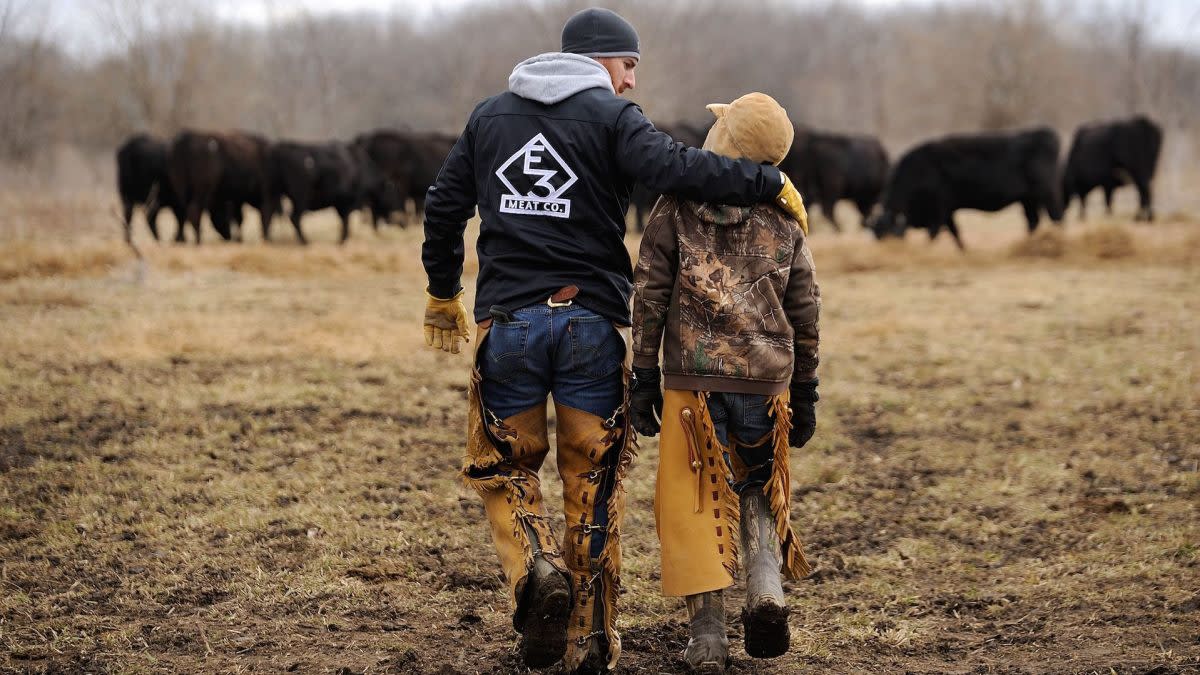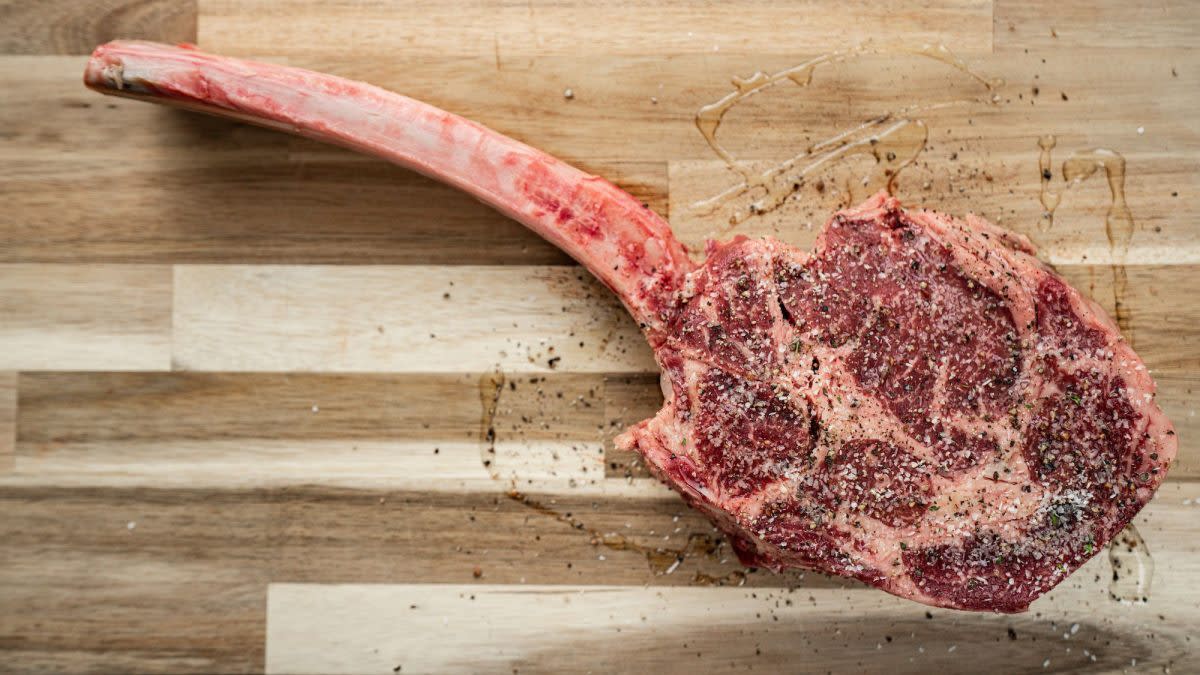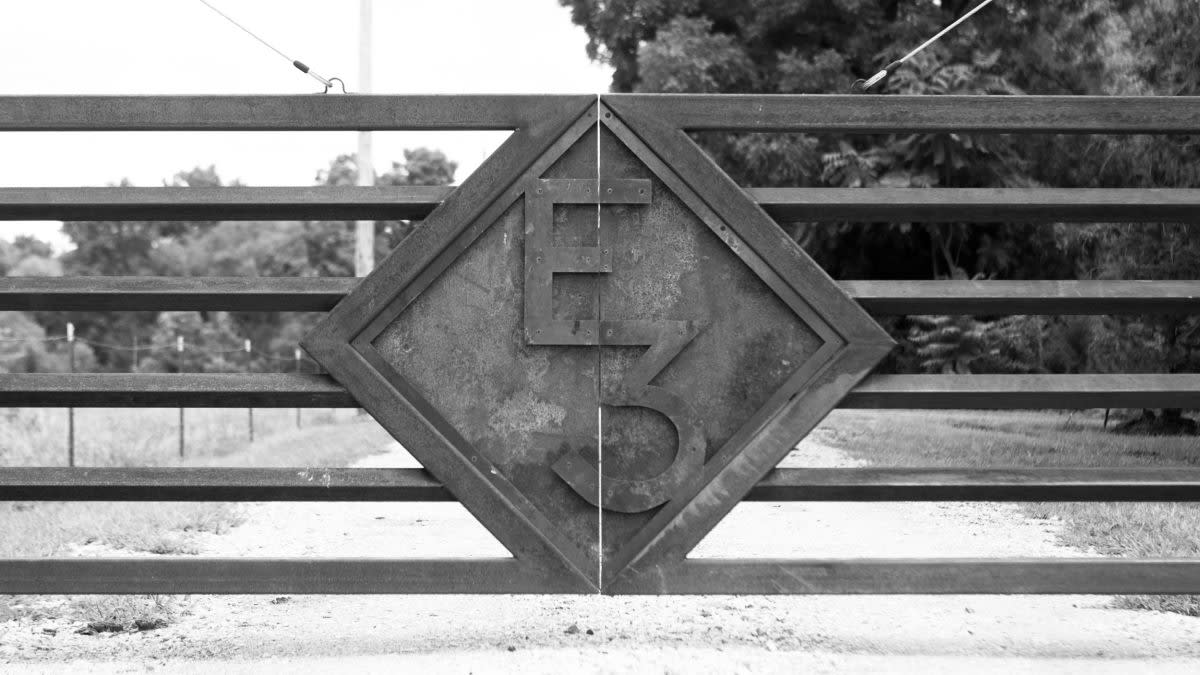Former MLB Star Adam LaRoche on Raising Cattle, Helping Veterans, and the Time Luke Bryan Stole His Hat
Adam LaRoche might be best known for his 12 seasons in Major League Baseball and his 255 homers, but these days, he’s making an even bigger impact off the field. After retiring from baseball in 2016, he launched E3, a direct-to-consumer meat company using grass-fed beef from his cattle ranch, and created the E3 Ranch Foundation, which supports military veterans and victims of human trafficking.
Although cattle ranching might seem like an odd pivot for a retired baseball player, LaRoche is no stranger to rural life. He grew up about a hundred miles south of Kansas City, and before making it to the big leagues, worked on local cattle ranch and spent his free time hunting and fishing. Despite his big break, the glitz and glamour of the city never appealed to him. Instead of splurging on a coastal mansion, LaRoche returned to his hometown and purchased a 3,200-acre ranch from his wife’s grandfather. Before long, he decided to start raising his own cattle with no antibiotics, hormones, or steroids.
What started as a small operation to feed his family soon transformed into a nationwide business––E3 Meat Company. Flash-frozen to maintain maximum freshness, E3 ships cuts of responsibly raised, grass-fed beef all across the country. Additionally, the ranching operation helps fund the E3 Ranch Foundation, which LaRoche is very involved with.
We recently caught up with the former first baseman to talk about returning to his roots in Kansas, his work with the foundation, and the story of how a baseball scoreboard and a stolen hat gave birth to the E3 brand.

Men’s Journal: After a successful MLB career, you could have gone anywhere but decided to stay in Kansas. What kept you home?
Adam LaRoche: When I was going through high school here, I couldn’t wait to get out and would have sworn that I was never coming back. But when I left and started spending plenty of time in the big cities, I realized the grass isn’t always greener. I started really missing it back in Kansas and realized it’s an awesome place to raise kids, and the hunting and outdoors are great. It just ended up being a no-brainer to stick around here.
What drew you to this particular ranch in Kansas?
It actually goes back to when I was in high school. This was my wife’s grandpa’s property. We started dating when I was a sophomore in high school, and I joke that the reason I asked her out is because her grandpa had some of the best deer hunting ground around, and dating his granddaughter was the only way to get access to it.
Now here we are, 20-something years later, and I still get to hunt on her land. So it’s a win-win––I got an awesome wife and a great property [laughing]. But this was always a cattle ranch, and I think our kids are now the sixth generation to be on the ranch.
When did you decide you wanted to start raising grass-fed cattle?
Before pro ball, I worked at a ranch out here part-time. And I’ve physically injected the growth hormone into the back of the ear of the cattle. So I understood the hormones, steroids, antibiotics, all the stuff that went into these cows, but never thought of any side effects.
Fast-forward and I get into pro ball and slowly start buying property off of my wife’s grandpa. But I started to question where our beef was coming from. I did a quick research project and it didn’t take long to find out that we have no idea. It’s really hard to verify that back to where it came from.
So we looked at our land and decided to buy some cows. We did Black Angus and didn’t use any antibiotics, hormones, or steroids. They were grass-fed, grain-finished and we would just do our own thing. At least that way we knew what we were feeding our family.

So it started with your family, but then your teammates started getting curious, right?
Oh, absolutely. Teammates started asking, “Hey, can I buy half a steer?” And then maybe their parents, other teammates, umpires would start asking, too. It just spread to where we were raising more and more cattle.
Back then, we would run to the local Walmart and buy a huge Coleman cooler. Then we’d drive 30 miles to Pittsburgh, Kansas, because that was the closest FedEx and dry ice facility. We literally were hand-packing probably 150 pounds of meat at a time and shipping them out to guys. Eventually my wife got tired of making the trip to Pittsburgh to ship beef. She suggested we start a website to make the process more efficient and less stressful. I would say that was the beginning of E3 Meat Company.
What’s the story behind the name of your company, E3?
The last thing I wanted to see was “E3” pop up on the scoreboard, because that means it’s an error on the first baseman. One day I was taking ground balls with a teammate of mine, a Gold Glove first baseman. I looked down and saw he had “E3” embroidered into his glove, and I just thought it was hilarious that another first baseman would put that on his glove.
So I stole that from him, named the ranch E3, and had some hats made. Then Luke Bryan came to my ranch to hunt one year and stole one of my hats. Then next thing I know he’s wearing it at the CMAs and I start getting blown up with people wanting to buy this hat. So that was kind of the birth of the E3 brand, Luke stealing my hat.
Once you decided to expand the operation, how did that transition go?
I realized it wasn’t as simple as just creating a website to turn it into a legitimate, formal business. There were growing pains that took probably four or five years of trial and error. However, now we’ve got a couple of chophouse restaurants opened up––one in Steamboat Springs, Colorado, and another in Nashville. We quickly outgrew the capacity for cattle here at the ranch, so we got other ranches to sign on to become E3 Certified Ranches, where they basically take our program and copy it to raise steers the same way that we do. We call it Never Ever Cattle. We never put any antibiotics, hormones, or steroids into them.
It’s been great because now those ranchers can get a premium for adjusting their program a little bit. Most of them already have programs with a great history. I love to think of it as kind of a win-win for both of us. They’re helping us out with our mission, and in turn, they get to make a little more money on it.

Your mission isn’t just to offer people high-quality beef, though. The sales support your E3 Ranch Foundation. Can you talk about that?
When I was playing in D.C., I got to spend time at Walter Reed––the military hospital there. I would see these 19- or 20-year-old kids in there that are missing an arm or missing both their legs. I would just hang with them and hear their stories. I was always blown away at how many of these kids wanted to get back over there with their brothers. They felt like they were letting their team down because they weren’t still fighting. It gave me a real perspective on how lucky we are to do the things that we do.
I stayed in touch with quite a few of those guys and eventually started hosting a couple of them out here at the ranch. We would fly them out for a hunt or fishing, and it got me thinking that we should start using this ranch that God gave us for something a little bigger.
Now with the foundation, we host groups of soldiers here and give them a place to rest and recharge. We basically hand them the keys to the ranch and help facilitate their stay as much as we can. We’re able to put them around like-minded guys and give them that team atmosphere that they miss so much.
So that’s the soldier side of it. The other part of our foundation involves helping victims of human trafficking. When I flew to Thailand to do some mission work with a youth pastor, the human trafficking I saw over there just totally wrecked me. But I quickly realized that it wasn’t just a third world issue; it’s going on in every country, even in the United States.
I got to work here with some of our task force guys, but soon realized it would be a lot easier if I was in law enforcement. So I went to the police academy in Kansas and became commissioned as a deputy sheriff. That allows me to attach as law enforcement and do a lot of work up in Kansas City with our human trafficking task force up there. It’s cool because I come in as a liaison between law enforcement and other nonprofits to expand forces and fill gaps.
We just bought a building in a pretty nasty spot of Kansas City, which is exactly where we needed to be. It’s going to be called Christine’s Place, named after a friend of mine that was trafficked up in Kansas City for 15 years. Now she’s helping us out and helping out other survivors, too. We are rebuilding it to be a drop-in center and safe house. It will be a safe place to take some of these girls before we get them into long-term placement.
Trafficking is such a complex problem, and it’s pretty hard to see if you’re not targeting it. A lot of times the victims are just really vulnerable. I’m passionate about our mission to help them.
This interview has been edited for length and clarity.
from Men's Journal https://ift.tt/36Y5BA3





0 comments